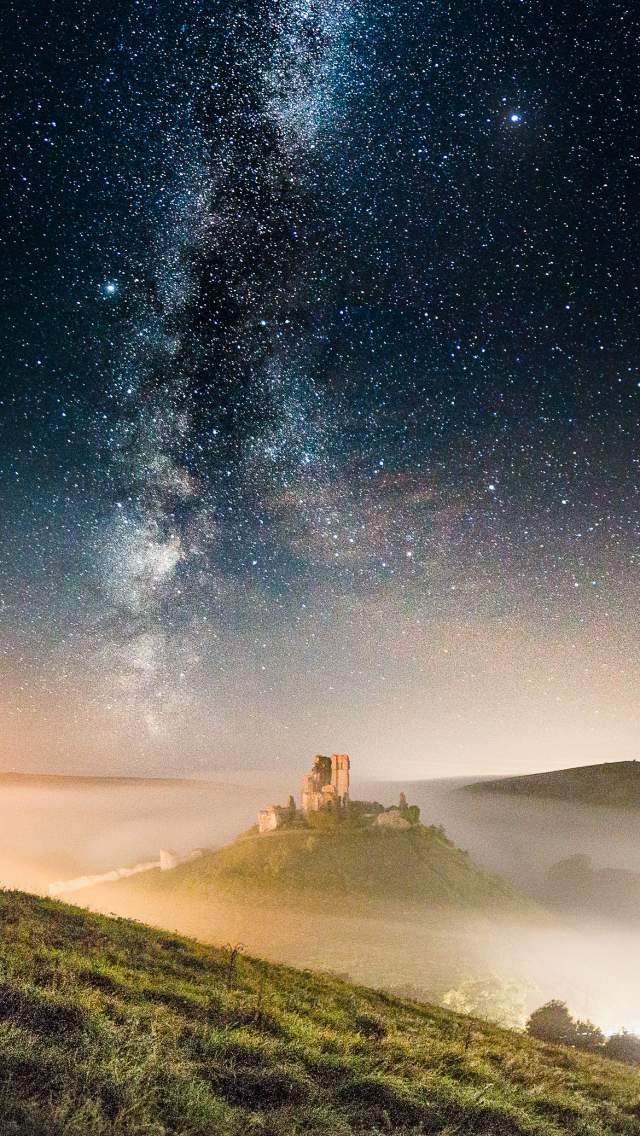Discover Dorset's dark skies
Now that we are in the autumn and winter months, you'll be able to see the incredible star viewing opportunities and astronomical sights in Dorset earlier in the evening, due to shorter days and longer nights. The shortest day of the year is on the 21 December 2024, which is the Winter Solstice.
Dorset's open skies
With over half of Dorset being National Landscapes and with many country parks, the county’s big open skies are perfect for seeing stars all year round. The clear dark skies of autumn and winter makes those seasons a perfect time of year for stargazing, especially for younger members of the family being able to join in before bedtime.
Dorset is fortunate to have low levels of light pollution which is one of the main issues for astronomers. There are locations throughout the county where visitors can experience incredible dark skies. There are dark sky events throughout the year, including stargazing evenings and talks, so why not join one on your visit and learn something new.
During 2022 a creative project called Green Space Dark Skies, gathered thousands of people offering them the opportunity to become Lumenators, each carrying a low impact light into the landscape in beautiful green spaces across the UK. Dorset’s National Landscape was one of the 20 places chosen across the UK for their beauty and dark skies.
Dark Sky Reserve
One of the best places for dark skies in Dorset is Cranborne Chase National Landscape. In 2019 Cranborne Chase became the first National Landscape in the country to be designated in its entirety as an International Dark-Sky Reserve. With only 22 International Dark Sky Reserves in the world, it is one of the best places in the country for stargazing. On a clear night you can see thousands of stars, the Milky Way and the Andromeda galaxy, which is over 2.5 million light years away!
So, whether you’re a complete beginner or the next Professor Brian Cox, start your Dorset dark skies adventure. You'll be over the moon with what you discover.
-
Dark Skies are everywhere, but unfortunately for many, the beauty of them is obscured by light pollution. Dark Sky Reserves or anywhere with ‘Dark Skies’ are areas that are minimally affected by Artificial Light at Night (ALAN). This not only makes the starry sky more visible, but it is also much better for wildlife and for human health: Nature needs the night!
-
Dorset has some of the darkest skies in southern England. You can see this clearly by looking at the light pollution map. It also has some fantastic stargazing locations which include beautiful landmarks, historical features and coastal areas which really do add something to your average stargazing evening.
-
The sky is darkest from about 2 hours after sunset to 2 hours before sunrise. You get the most amazing starry nights during the summer, if you stay up late enough, but stargazing over the winter months once the clocks have gone back makes it a truly family affair. Different seasons also have different highlights:
Autumn – Milky Way (our galaxy)Winter – Sparkling star clusters
Spring – Distant galaxies
-
Anywhere you are away from artificial lights once the sun’s gone down. The show the night sky puts really takes your breath away on a clear night. The darkest skies are those of Cranborne Chase International Dark Sky Reserve but much of Dorset, away from artificial light can be just as impressive. Gardens also offer a good option if you’re lucky enough to live or be staying somewhere dark!
-
Your eyes! Seriously, from a dark site you can see an enormous amount without any optical aid, just as everyone did before the invention of the telescope in the 16th Century. If you like, try binoculars; you’ll be astounded at how much more you can see: craters on the Moon, star clusters, distant galaxies, and many, many more stars. We would also recommend warm clothes, hot chocolate and marshmallows and something to lie on. A deckchair is great as you’re comfy and you won’t get a sore neck.
-
For desktop and laptop computers, Cranborne Chase Dark Sky Reserve recommends Stellarium. It’s free and exceptionally powerful . For Android or iOS devices, they recommend Sky Safari or Stellarium Mobile (Android Only).
-
It’s a good idea to visit your intended stargazing location during daylight, so you can be aware of any potential hazards and to make sure that the location allows access at night. If you feel nervous about being out alone in the dark, go with a friend or join an organised event. Make sure you know how all your equipment works beforehand, and check it over to ensure that nothing is faulty. Make sure you put any potential trip-hazards out of the way (e.g. between tripod legs).
We  stargazing
stargazing
View All
Want to know more?
Read our beginners guide to stargazing
Experience dark skiesin Dorset
Cranborne Chase National Landscape
Cranborne Chase is the first National Landscape in England to become an International Dark Sky Reserve
Dark sky activities to experience
Twilight adventures and nocturnal creatures in darkest Dorset.
Astronomy and dark sky events
Learn when to look for meteor showers or join a Dorset stargazing event.
International Dark Sky Reserve
Find out more about the scheme from Steve Tonkin - Dark Sky Advisor.
Astrophotography in Dorset
Learn how to photograph the night sky, online tutorials and Dorset workshops.
Capture the beauty of Dorset
Kevin Ferrioli shares his favourite Dorset locations and the best time of year to capture great images.
Where to stay
Ideas of places to stay that are great for stargazing











